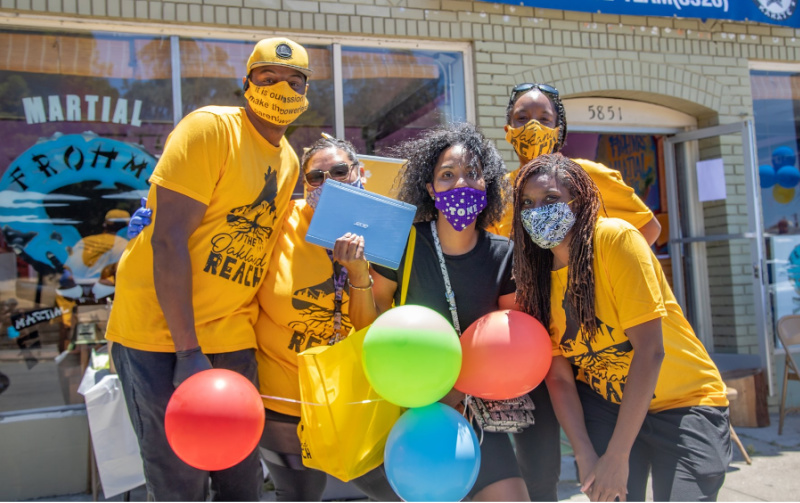“Pods” for the People: Libraries Host Learning Pods to Serve Students in Need | From the Editor
Seven months of learning loss. That’s the impact wrought by the pandemic, and low-income, Black, and Latinx children stand to suffer the most. Some cities are adapting the pod concept, working with community partners to serve at-risk students.
 |
| The Oakland Reach, a grassroots, parent-led group has launched a virtual learning hub |
It’s fall and the start of a new school year, one like no other.
Whether remote, in-person, or some scenario yet evolving—students, educators, parents, and communities are all plying uncharted waters (imagined on our September 2020 cover by illustrator Caitlin Kuhwald). And the stakes couldn’t be higher.
Seven months of learning loss. That’s the impact wrought by the pandemic, according to McKinsey & Company, weighing multiple factors—from working parents grappling with childcare or suffering job loss to social isolation of children—which compounded four months of the health crisis in the research firm’s June analysis.
Low-income, Black, and Latinx children stand to suffer the most. Black students could be set back academically by more than 10 months, and Latinx students, nine months, per the McKinsey report. Exacerbating the gap between the haves and have-nots, poor children are less likely to experience high-quality remote learning or access suitable devices and high-speed internet. These kids could fall behind by a full year.
The well-to-do, in contrast, have options. To offset a school term that alternately feels unsafe if in-person or inadequate in the case of fully remote instruction, wealthy families have turned to forming pandemic or learning pods, in which tutors or teachers hired by parents instruct small groups of kids in person.
Some cities are adapting the pod concept, working with community partners to serve at-risk students.
When New Orleans schools committed to a fully remote fall start, the city organized Learning Hubs in cooperation with the parks system and the New Orleans Public Library. Providing children ages six–16 with internet access and “safe spaces” for supervised independent learning, four hubs opened this month, with more to come pending demand.
 In San Francisco, Community Learning Hubs will open their doors September 14, providing free, full-day programming and access to technology for distance learning. Enrollment will prioritize youth in need, including those from low-income families or those in public housing or foster care, and English language learners. Administered by the San Francisco Department of Children, Youth and Their Families, hubs will be hosted at 15 branches of the San Francisco Public Library (SFPL). “They are a continuation of our mission,” says Kate Patterson, SFPL spokesperson.
In San Francisco, Community Learning Hubs will open their doors September 14, providing free, full-day programming and access to technology for distance learning. Enrollment will prioritize youth in need, including those from low-income families or those in public housing or foster care, and English language learners. Administered by the San Francisco Department of Children, Youth and Their Families, hubs will be hosted at 15 branches of the San Francisco Public Library (SFPL). “They are a continuation of our mission,” says Kate Patterson, SFPL spokesperson.
Beyond a stopgap in an emergency situation, learning hubs or pods might be a whole new model of education, according to CRPE (Center on Reinventing Public Education).
Take the Oakland REACH, a grassroots, parent-led group dedicated to better education for local, underserved communities. Responding to the pandemic, the organization created a Virtual Hub (pictured, a participating student) with offerings ranging from ongoing classes in a “Literacy Liberation Center” to referrals to family and student resources. Cited by CRPE, the Oakland REACH Hub is an exemplar of what hubs can achieve, involving entire families and accommodating individuals, particularly those students who have been underserved in the traditional school system.
After schools reopen, hubs could help counter learning loss post-pandemic, providing more children with critical support, along with social emotional and other resources to serve whole families.
Holistic and democratic in approach, learning hubs are akin to libraries. To aid in the recovery and thrive thereafter to serve their communities, both will need our support.

Kathy Ishizuka
Editor-In-Chief
@kishizuka

RELATED
The job outlook in 2030: Librarians will be in demand
The job outlook in 2030: Librarians will be in demand
ALREADY A SUBSCRIBER? LOG IN
We are currently offering this content for free. Sign up now to activate your personal profile, where you can save articles for future viewing






Add Comment :-
Be the first reader to comment.
Comment Policy:
Comment should not be empty !!!